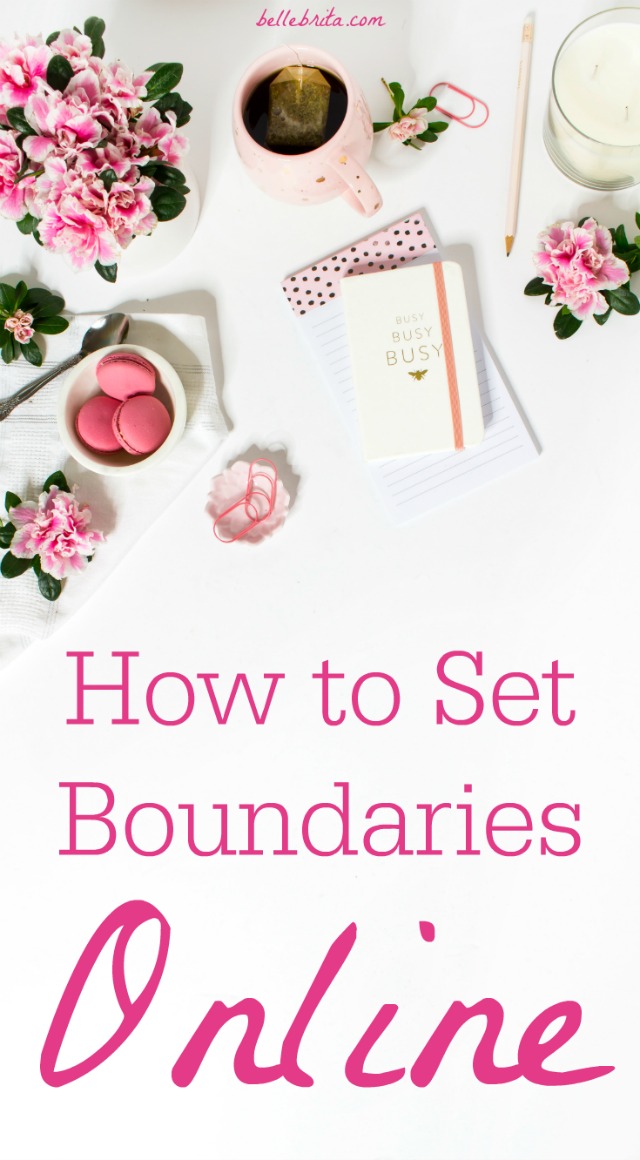Welcome to the ninth day of the 2018 Love Blog Challenge! Today’s prompt is Boundaries. Check out the announcement post for all the prompts and rules this month. You can still join the link-up for yesterday’s topic, Balance.
For this topic last year, I explained how I set boundaries as a blogger to protect both myself and the people in my life. While I love being honest about my life, some stories aren’t meant to be shared online.
Today I want to share how I set boundaries online to protect my time, my energy, and my emotional well-being. I use this approach on my blog, on social media, and across the Internet.
Related: How to Set Boundaries as a Blogger

Why You Should Set Boundaries Online
We all have 24 hours in a day. After sleeping, eating, working, and other daily activities, how much free time do you have?
Regardless of what that number might be, most of us would appreciate more free time to devote to leisurely activities. It’s a digital age, so at least some of those leisurely activities are online.
How much of your online time do you want to devote to arguing? How much of your energy do you want to expend on jerks and idiots?
When I set boundaries online, I’m protecting myself. While this includes thinking about whether or not to share my own story, my boundaries go beyond that. I’m also thinking about what I can do to keep my mind focused on what truly matters to me. I’m considering whether or not someone’s words are worth my time and my energy.
Sometimes I can’t entirely ignore someone’s hurtful words, but I can take steps to keep that person from hurting me again. I can choose not to engage with them.
I’ve noticed on my blog and on Instagram, some people think they’re entitled to my time. They’re not. Just because you comment on my work doesn’t mean I have to respond to it, let alone publish it.
I set boundaries online to honor my time and my emotional well-being. These are some of the ways I do that.

When Someone is Wrong on the Internet
It’s so hard being right, especially when other people are wrong. All I want to do is type furiously and tell them how wrong they are, preferably with multiple sources to back up my intellectual superiority!

But if I honestly did this, I would spend my entire life online, arguing with perfect strangers.
I have better things to do… most of the time.
So how do I decide when to engage with a post, when to ignore a post, when to hide a post, and when to delete a post and block the poster?
Harassment: Trolls, Jerks, and Creeps
I mostly only deal with people harassing me in the comments of my blog or on Instagram. Which still basically sucks, but at least it’s not on other platforms too.
Trolls basically write something inflammatory for no good reason. Often their comments don’t make any sense. They tend to choose anonymous platforms to harass people. Trolls on my blog inevitably use the “Guest” option on Disqus with a throwaway email account.
With few exceptions, I block trolls. They are not worth my time or my energy.
I differentiate jerks from trolls because jerks tend to write lengthy, hurtful comments. Just a few months into Belle Brita, a jerk wrote a short essay to explain all the reasons why my marriage will end in divorce. I had to decide whether or not to publish his sexist–yet surprisingly articulate–tirade in my comments section. I decided that mean people don’t get to use my blog platform for their rude opinions. After deleting his comment, I blocked him from commenting again.
I’ve also learned to block IP addresses, rather than users, after one mean person went back and forth between troll comments and borderline mean comments. I kept blocking the user, but after I finally blocked the IP address of the worst one, I realized all the comments came from the same IP address.
Instagram is filled with creeps. My phone is filled with screenshots of all the inappropriate messages I receive. These range from the tame, but unwanted comments on my physical appearance to photos of genitalia. When random men send me hearts or just say hello, I delete their messages, but I don’t block them. But when random men sexually harass me, I report their accounts to Instagram and block them.
None of these people are worth my time. None of them are worth my energy. Sometimes their cumulative harassment gets me down, but I’m lucky to have a husband and friends who will listen to me rant.
Ignorance
I’m so over political memes. They’re just a lazy way of getting people who already agree with you to applaud you and pissing off people who disagree with you. There’s no carefully measured words, thoughtful discourse, or even facts backed up by evidence.
I don’t care what your political ideology is–I don’t want to see your memes. The vast majority of the time, these memes are on Facebook, where I can easily hide them. No need to unfollow or defriend someone. When the meme is particularly ignorant or obnoxious, I hide all from the original page that posted it.
But memes aren’t the only forms of ignorance. When someone writes an ignorant blog post, or makes an ignorant Facebook post, I have to evaluate the post on a case-by-case basis.
What relationship do I have with the person making ignorant statements?
Sometimes a quiet private message with a gentle correction is the best way to go. I would hope that if I posted something ignorant online, a loved one would contact me quietly. Usually a short message with a link to Snopes does the trick.
Does the ignorance hurt anyone?
If someone wants to scaremonger about GMOs or household cleaners or whatever, that’s cool. I don’t care enough to say something. I’m not too worried about any detrimental effects.
But when the ignorance could hurt other people reading it, then I’m more likely to respond. This is all the more true when I’m a near-expert in the subject matter, like sexual assault. Sadly I’ve seen a number of ignorant posts about sexual assault, posts completely devoid of compassion for survivors. In situations like that, I feel compelled to respond with a combination of statistics (with citations) and an appeal for compassion.
I don’t do this to convince the ignorant person; I do this to support any survivors reading the conversation. This makes a difference. Frequently when I do this, someone contacts me privately to thank me.
How easily can I refute the ignorance?
The more I know on a subject, the more easily I can refute ignorance. For certain topics, I know exactly where to find reputable sources to cite as evidence. In those cases, it doesn’t take up much of my time to respond.
But if I only generally know that someone is wrong, without knowing how to prove it quickly, then I’ll probably not say anything. I only have so many hours in the day, and I don’t want to waste them doing extensive research to combat ignorance.
I consider all of these questions when deciding whether or not to engage with ignorance online.
Meet Your 2018 Love Blog Challenge Hosts!

Twitter // Instagram // Facebook // Pinterest // Tumblr // Google+ // Bloglovin
Brita Long is the pink and sparkly personality behind the Christian feminist lifestyle blog, Belle Brita. While her first love will always be Paris, she lives happily with her husband Daniel Fleck in the Atlanta area.

Twitter // Instagram // Pinterest // Bloglovin
Alessia is a lifestyle blogger, entrepreneur and post-graduate student in History from the best borough in London, up and coming Croydon. She’s a bit like Emma Woodhouse (Pemberley Digital version) and just about no longer the most eligible Catholic bachelorette, as she has found her Mr Knightley in sunny Derbyshire.

Twitter // Instagram // Pinterest // Facebook // Bloglovin
Ivanna is a registered nurse who loves expressing her creative side. She enjoys thrifting, learning about sustainable living, and anything purple. She writes on Provocative Joy about living unconventionally, and she loves to inspire people to realize their potential to be world-changers.

How do you set boundaries online? P.S. It’s not too late to enter the LuLaRoe giveaway!
